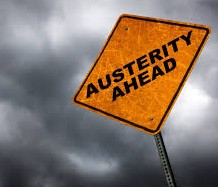
Austerity and Euroscepticism: The End of EU Development Cooperation?
The financial crisis and its aftermath have brought to light the crisis of European integration, more precisely the crisis and potential demise of a certain approach to integration pursued since the early 1950s. The demise of an allegedly inevitable ‘ever closer Union’ pursued primarily in a technocratic way predates the turmoil which started in late 2008. The escalating struggle between European institutions and member states, buttressed by the rise of popular distrust, seems to emerge as one of the biggest challenges to European integration.
dev aidIn development cooperation, an area of ‘shared’ competences between the EU institutions and the member states, it has remained unexplored how economic recession, the sovereign debt crisis, austerity, the struggle in the eurozone and increasing Euroscepticism have affected the relationship between the EU and its member states.
EU aid has undeniably been affected. Significant cuts to bilateral aid budgets due to the consolidation of public finances have reduced member states’ willingness to pool further resources and competences in Brussels. Instead, member states have shown an increasing tendency to operate on their own or in like-minded groups, and focus on inward-looking aid policiesdriven by national interests and priorities.

The EU and the one billion bitcoin question
From London to Rome, Warsaw and Athens, mainstream politicians seem determined to give us yet more of the medicine that caused the problems in the first place: deregulation, marketization, privatization and cuts to schools, hospitals and environmental protection. The public does not seem to trust the establishment any longer, but it has learned that changing governments does not lead to any significant change of government policies. We seem to be stuck with neoliberal recipes, with no alternatives in place. The one billion bitcoin question is why?
With the 2008 financial meltdown and then the euro crisis, we all know the price of neoliberal economics. Inequality within and across countries is cascading, with no U-turn in sight. Public money is chiefly used to help large multinational banks, but not to help small investors getting off ground or researchers inventing new technologies. Tax havens are tolerated, while state pensions are being cut. Governments seem determined to clamp down on small unemployment benefits, but not on executive directors’ huge bonuses. Zero hour contracts are spreading, and trade unions portrayed as harmful relics of the past. No wonder those autocratic rulers of China and Russia are looking at present-day Europe with contempt and self-satisfaction.
There are three possible answers, which focus on actors, democracy and ideology.

On the path to inequality
What do we really know about how wealth and income have evolved since the 18th century and what lessons can we take from that for centuries to come? For Thomas Piketty in Capital in the Twenty-First Century, one lesson is clear: inequality is self-generating within a capitalist system.
Capital, a magnificent 650-page work, first appeared in France late last year and already looms, in Paul Krugman’s eyes, as ‘‘the most important economics book of the year — and maybe of the decade’’. It is important because inequality is emerging as what Barack Obama recently called ‘‘the defining challenge of our time’’.
Piketty, whose work on income inequality helped inspire the Occupy Wall Street movement, is particularly well placed to answer these questions. He is a bit of a strange creature in modern economics: as much an economic historian and archeologist as a number-crunching theorist.
An academic at one of France’s elite grandes ecoles, Piketty has spent the past 20 years not only seeking to come to grips with economic inequality but also to make his conclusions digestible for public consumption.
After a period at the top American universities in the 1990s, he returned to France convinced American economics was infused with a ‘‘childish passion for mathematics’’ and was merely a forum ‘‘for purely theoretical and often highly ideological speculation … preoccupied with petty mathematical problems of interest only to themselves’’. In Capital, Piketty has surely avoided that.

When the Party’s Over: The Politics of Fiscal Squeeze in Perspective
Fiscal austerity, fiscal consolidation and spending cutbacks currently dominate the politics of many of the world’s democracies. Old political arguments are being tested with new battles emerging over whose expectations are to be disappointed and who should be blamed for fiscal squeeze. Can the fiscal travails of the early United States in the 1840s, when half of the states then in the Union had to default over their debts and new unpopular taxes had to be imposed in the middle of an international trade slump, help us draw lessons for the Eurozone debt crisis of the early 2010s? Could cases often presented as ‘poster children’ of successful fiscal consolidation (and at those often portrayed as failures or ‘basket cases’) inform us about the politics of those fiscal squeezes? Can governments that copy ‘good’ examples of fiscal squeeze escape punishment at the polls? A recent conference on the politics of fiscal squeeze explored some these issues and looked at how it has played out in different times and places. It considered in depth nine cases of fiscal squeeze (defined as the political effort that goes into reining in expenditure or raising taxes) and explored what conclusions we can draw for current debates about fiscal squeeze from earlier cases in other democracies.

The G8 Leap of 2013: Needs to be higher, farther
The recently concluded G8 meeting at Lough Erne took an unprecedented leap by turning the focus on corporate governance. Among the greatest institutional challenges of our times, is the regulation of multinational corporations which operate across national borders and have the ability to shift labour and capital more than ever before. The G8 agenda focussed on open trade, fair taxes and increased transparency (the 3Ts agenda). Open trade- a part of all multilateral meetings saw the usual narrative of commitment to more trade with lesser transaction costs. However, the need for fair taxes and transparency of corporations took centre-stage for the first time.
The G8 expressed their commitment to establish automatic exchange of information between different national tax authorities and their support to the Organisation for Economic Cooperation and Development (OECD) to develop a multilateral system to implement it. The G8 also proposed a common template that will require MNCs to report profits made and taxes paid across the world. The rationale behind these initiatives is to prevent corporations to actively avoid tax through tax havens and shifting profits. There was also a mention of making relevant price information available across jurisdictions to implement international transfer pricing rules. OECD in the recent years has been working on multiple initiatives to counter the problem of base erosion and profit shifting (BEPS). The G20 also expressed support for OECD’s Global Forum on Transparency and Exchange of Information which has been tasked to create international standards of tax reporting in 2008 and 2012.

Spring in Sofia? Bulgaria’s struggle for social rights
Bulgaria’s constitution includes a wide range of social rights. However, the ‘democratic, law-governed and social state’ has been characterized as ‘chronically incapable of coping with its social problems or improving its level of economic prosperity’. Moreover, the Bulgarian neoliberal ‘minimal state’ often cannot provide its citizens even with basic necessities, such as food, electricity, central heating, or medical care. The post-socialist radical and extensive privatization and economic restructuringhave led to systemic impoverishment, decimating entire sectors of the economy and society.
The state often has appeared to be merely a prize that players try to capture rather than a guarantor of law and the basic services necessary for civilized and decent life. The post-socialist reformshave resulted in acute inequalities and disenfranchisement. With public discontent seemingly on the rise, strong social movements of ‘democratic populism’ and ‘redemptive radicalism’ increasingly capture the public vote.

Unpacking ‘the 99 per cent’
Occupy has spotlighted the super-elite, but the ‘average Brit’ that is pitted against this class does not exist. For the struggle to empower all citizens to succeed in Britain, mapping actual wealth distribution is critical. [This is the second of three pieces exploring wealth distribution in Britain. It sits within our Democratic Wealth debate, in partnership with OurKingdom.]

Spain: Time for more structural reform
Spain has now been in recession for almost five years, and has had to face challenges and tackle each of them in very different ways. In the beginning, the concern with national public spending, led to severe budget cuts in 2011 and 2012. Later, the need to reform the labour market emerged in order make it more flexible and competitive, prompting a general strike in March of this year. A few months ago doubts about the health of the Spanish financial system surfaced. Would Spain be capable of recapitalising its banks without putting its overall solvency at risk? European partners stepped in and structured a bailout of Spanish banks that attempted to de-couple financial and sovereign risk. Today we read …









